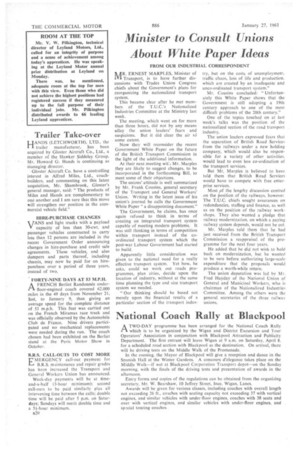Minister to Consult Unions About White Paper Ideas
Page 28

If you've noticed an error in this article please click here to report it so we can fix it.
FROM OUR INDUSTRIAL CORRESPONDENT
it 4R. ERNEST MARPLES, Minister of in Transport, is to have further discussions with Trades Union Congress chiefs about the Government's plans for reorganizing the nationalized transport system.
This became clear after he met members of the T.U.C.'s Nationalized Industries Committee at the Ministry last week.
The meeting, which went on for more than three hours, did not by any means allay the union leaders' fears and suspicions. But it did clear the air td' some extent.
Now they will reconsider the recent Government White Paper on the future of the British Transport Commission in the light of the additional information.
At their next meeting wit" Mr. Marples they are likely to suggest changes, to be incorporated in the forthcoming Bill, to meet some of their objections.
The unions' attitude is well summarized by Mr. Frank Cousins, general secretary of the Transport and General Workers' Union. Writing in the latest issue of his union's journal he calls the Government White Paper "a disappointing document."
The Government, he claims, has once again refused to think in terms of creating an integrated transport system capable of meeting modern problems. It was still thinking in terms of competition within transport instead of the coordinated transport system which the post-war Labour Government had started to build.
Apparently little consideration was given to the national need for a really effective transport system. Yet how, he asks, could we work out roads programmes, plan cities, decide upon the location of industry, without at the same time planning the type and size transport system we needed.
"Our thinking should be based not merely upon the financial results of a particular section of the transport indus
try, but on the costs of unemployment. traffic chaos, loss of life and production. which are created by an inadequate and unco-ordinated transport system."
Mr. Cousins concluded: "Unfortunately this White Paper shows that the Government is still adopting a 19th century approach to one of the most difficult problems of the 20th century."
One of the topics touched on at last week's talks was the position of the nationalized section of the road transport industry.
The union leaders expressed fears that the separation of British Road Services from the railways under a new holding company, which would also be responsible for a variety of other activities. would lead to even less co-ordination of the transport services.
But Mr, Marples is believed to have told them that British Road Services would have to compete with free enterprise services.
Most )of the lengthy discussion centred on the position of the railways, however. The T.U.C. chiefs sought assurances on redundancies, staffing and finance, as well as on the position of the railway workshops. They also wanted a pledge that railway modernization, on which a paying railway system depends, would not be cut,
Mr. Marples told them that he had just received from the British Transport Commission a reappraisal of the programme for the next four years.
He added that he did not wish to hold back on modernization, but he wanted to be sure before authorizing large-scale expenditure that the proposals would produce a worth-while return.
The union deputation was led by Mr. Fred Hayday of the National Union of General and Municipal Workers, who is chairman of the Nationalized Industries Committee. Among the others were the general secretaries of the three railway unions,
















































































































